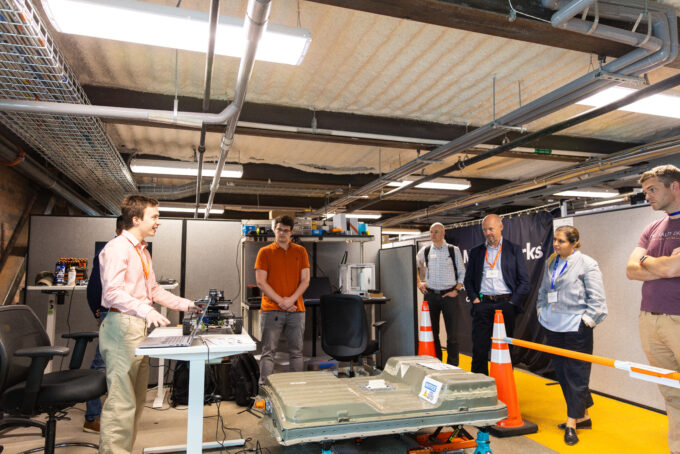If you’ve been anywhere near the tech world in the last two years, you know AI is touching every corner of innovation. But at Greentown Labs’ recent investor roundtable in Boston, the conversation went beyond flashy LLMs and ChatGPT’s latest tricks—diving deeply into how AI is fundamentally reshaping climatetech, for better and worse.
With representatives from Clean Energy Ventures, the Massachusetts Clean Energy Center, Shell Ventures, BCG X, and more in the room, the discussion ranged from AI’s troubling energy demands to its potential as a climate problem-solver. Here’s what stood out.
1. AI Is Changing the Game—But at What Cost?
One investor put it bluntly: “If AI isn’t changing your business model, you’re probably missing something.”
The consensus? Generative AI isn’t just another trend—it’s a tectonic shift. Startups need to explore what value their technologies bring to an AI-powered world, and how to avoid becoming obsolete.
But here’s the thing: AI’s carbon footprint is the elephant in the server room. Data centers already consume as much water as small cities, and global electricity demand from data centers is projected to more than double by 2030—reaching around 945 terawatt-hours, which is slightly more than Japan’s current total electricity consumption—largely driven by AI increases. One attendee shared a sobering stat: Every megawatt-hour of energy a data center consumes requires seven cubic meters of water.
So if AI is here to stay, how do we keep it from derailing the energy transition?
The Silver Lining? Efficiency Innovations
The good news? AI is also helping solve the problem it’s exacerbating. Startups like Neuralix AI (a Shell.ai Hackathon winner) are using AI to optimize industrial energy use, while Reon Technology is squeezing 2-4x more capacity out of battery systems.
There’s also opportunity—and market demand—for innovations that make AI systems themselves more efficient. For example, Vertical Horizons is developing a technology that is directly aimed at minimizing the unnecessary losses occurring during power conversion and distribution. As one investor said, “The breakthroughs are messy, but they’re coming fast.”
2. Proprietary Data is the New IP
The big buzzword at the roundtable was “prop data” (proprietary data). In a world where OpenAI can clone some startups’ core features overnight, unique datasets are crucial. Case in point: Gaia AI, an MIT spinout, is building digital twins of forests. It collects high‑resolution information using drones, LiDAR, GPS, and satellite imagery, then applies advanced computer vision and AI to transform the data into its analytics platform. As a result, its hyper-accurate, scalable forest mapping is already landing the startup government contracts.
Other Greentown members and alumni leaning into niche prop data include:
- 7Analytics is delivering flood predictions so precise they’re rewriting insurance risk models.
- Cyvl is an AI-native startup using imaging to detect infrastructure defects and help cities optimize infrastructure spending.
- QEA Tech is using drones and thermal imaging to audit buildings’ energy loss and recommend retrofits that can slash loss by up to 40%.
3. The Non-flashy (But Critical) Wins
Even amid the group’s AI excitement, a contrarian thread emerged: Sometimes, boring is better. Some AI advances may seem minor, but a 2% efficiency gain in a gas power plant at scale is a climate game-changer. Startups like MoveEV (streamlining fleet charging reimbursements) and Climative (using AI to nudge homeowners toward retrofits) are proving that incremental gains add up.
One investor summed it up: “AI won’t save the planet alone. But it’s a hell of a tool if we use it right.”
Final Thought: The AI-Climate Paradox
AI has the potential to be both a villain (energy hog) and hero (optimization Swiss army knife) in the climate fight. The startups that’ll thrive? Those tackling the duality head-on—like Planckton Data, which helps companies future-proof against regulations while cutting emissions, or EVident Battery, which uses AI to spot EV battery flaws before they become disasters.
One thing’s clear: The climatetech race isn’t just about who has the smartest AI. It’s about who uses it wisely. And if this roundtable was any indication, the race is on.
Check out Greentown’s startups here—or just ask ChatGPT. (But maybe don’t ask it to calculate its own water footprint.)
Investors: Join Greentown’s Investor Program to participate in our upcoming roundtables in September.
Marita Genebashvili is the Director of Investor Program at Greentown Labs.
Photo: EVident Battery during the startup showcase at Climatetech Summit 2024


